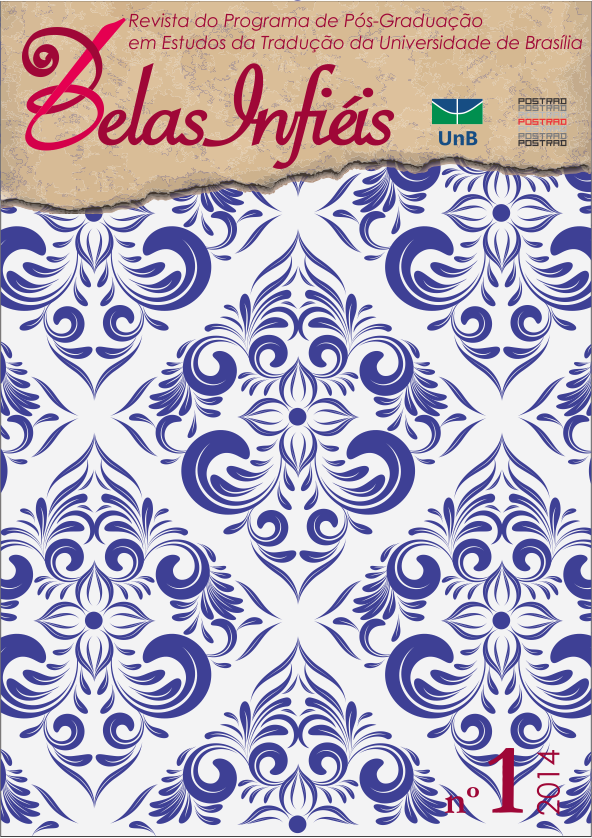ARCHITECTURAL SYMBOLISM AS INTERSEMIOTIC TRANSLATION:
MALCOLM BRADBURY’S THE HISTORY MAN
DOI:
https://doi.org/10.26512/belasinfieis.v3.n1.2014.11261Palabras clave:
architecture, intersemiotic translation, radicalism, sociology, structureResumen
Campus novels describe isolated, almost autarchic utopias. In Malcolm Bradbury’s The History Man, this utopia is projected into a dystopian dimension by a functional and transparent architecture. The epoch is that of radical sociologists who fight against tradition, memory, privacy, and subtlety. The paper analyses the influence architecture can have on people’s minds and behaviours, or the damages inflicted by concrete-and-steel structures upon human configuration. This is a study about the excesses of structure.
Descargas
Citas
HALL, Stuart; DU GAY,Paul(eds.).Introduction: Who Needs Identity? Questions of Cultural Identity.London: Sage, 1996, p.1-17.
LEITER, Brian; SINHABABU, Neil (eds.).Nietzsche and Morality. Oxford: Clarendon Press, 2007.
LASH, Scott; URRY, John.Economies of Signs and Space. London: Sage, 1994.
MORACE, A. Robert. The Dialogic Novels of Malcom Bradbury and David Lodge. Illinois: Southern Illinois University Press, 1989.
RICOEUR, Paul(ed.). Hermeneutics and the Human Sciences. Translated by John B. Thompson. Cambridge: CambridgeUniversity Press, 1981.
RORTY, Richard. Contingency, Irony and Solidarity. Cambridge: Cambridge University Press, 1989.
STEVENSON, Randall. The British Novel since the Thirties: An Introduction, London: Greener Books, 1976.
TAYLOR, D.J.After the war: The Novel and England since 1945. London:Chatto & Windus, 1993.
WOODWARD, Kathryn. Identity and Difference. London: Sage, 1997.
Descargas
Publicado
Cómo citar
Número
Sección
Licencia
Copyright Statement
Given the public access to this journal, the texts are free to use but requires the recognition of the original authorship and initial publication in this journal to be properly stated.
The journal allows the use of works published for non-commercial purposes, including the right to submit the work to publicly accessible databases. Published contributions are the sole and exclusive responsibility of the author(s).
- When submitting papers to be evaluated by the Belas Infiéis journal, the author(s):
- Declare that the contents of the contributions are original and of their original creation, being entirely responsible for their content if there is an objection by third parties.
- Claim to be aware that they should not commit academic plagiarism.
- Declare that the manuscript has not been published, completely or partially, in Portuguese or another language. If it is a translation it should be submitted to the Translated Articles section.
- Declare that the manuscript is not being evaluated by other journals.
- Declare that the manuscript was not submitted to another journal simultaneously.
- Commit(s) to inform the journal of any kind of error or inaccuracy in their contribution (published, in evaluation or in editing) and to collaborate with the editors to make due corrections of the article (when in evaluation or editing) or erratum/retraction (after publication).
- Declare that there is no conflict of interest regarding the published work.
- Authorize its release if it is accepted for publication without any kind of monetary compensation.
- Agree to assign non-exclusive rights to publication to the magazine, remaining free to make their contribution available in other media as long as the publication of the first version in Belas Infiéis magazine is mentioned. They also authorize Belas Infiéis to assign their texts for reproduction in content indexers, virtual libraries and similar platforms.
- Maintain copyright and grant the journal the right of first publication, the work being licensed under theCreative Commons Attribution License.
- Is/Are allowed and encouraged to publish and distribute their work online after the editorial process, which may increase the impact and citation of the published work.
- Authorize the editorial team to make textual adjustments and to adapt the article to the publication rules, when necessary.



















